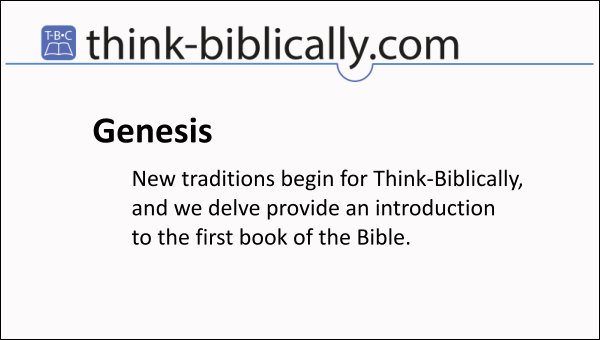By Tyson Thorne

Today we're back to full time, publishing three articles per week. After having performed fresh research and study we're sure that Think-Biblically.com will continue to be the kind of site you want to keep reading. More Bible, more modern application and thought, and more insight into the character of the God we serve. All designed to help you build relational connections to the Creator and to, as Johannes Kepler once encouraged us, to "think God's thoughts after him." Toward that end, we'll be taking a more planned approach with our publishing schedule, at least for the next few months.
On Tuesdays we'll be offering up short introductions to every book of the Bible. Our eventual goal will be to write a full study of every book, and these intros will get that ball rolling. On Wednesdays we'll be addressing the Bible in media. This might be movie or book reviews, new archaeological discoveries, or even how to apply the Bible to what we observe happening around the globe. On Thursday's we will do a study on the name's of God. We're starting this series with a bang, presenting a name that you have probably never heard before — even on this site.
So let us get started on the next chapter...
Introduction to the Book of Genesis
The progression of Genesis is simple: God’s orderly creation of the Universe, and mankind, climaxing in His blessing man with dominion, and then the chaotic disruption of and disintegrating work of sin with its two greatest disciplines being the great flood and Babel. As stated by David Van Biema in the October 28, 1996 edition of TIME Magazine in Genesis Reconsidered,
The first book of the Old Testament and of Jewish Scripture falls into two parts: primeval history (chapters 1-11); and the patriarchal tales (12-50). The first part covers the Creation, Adam and Eve, Cain and Able, the Flood and the Tower of Babel and establishes the basic premise of a God who acts in the history of His most problematic creation. The last three quarters of Genesis, by contrast, is the wild and woolly saga of one family more widely perceived as historical. Exhorting Abraham to leave his father’s house and country, God offers him incalculable descendants and property. Abraham accepts, and the rest of Genesis describes his triumphs and travails and those of his son Isaac, grandson Jacob and great grandson Joseph; as they and their extended families are tested by hostile neighbors, famines, recurrent infertility and sometimes by the Deity himself. Divine intent and human ambition blur as each generation, often through painful winnowing, produces a champion to advance Israel’s destiny. The book ends with Abraham’s tiny clan blossomed into the foundations of the 12 Hebrew tribes and a brace of other nations; and the assurance that the people of the Covenant will survive, and with them, the Covenant itself.
Author and Setting
Though liberal scholars reject the traditionally held author of Moses, there is a strong and ancient tradition of Moses as the author. The most compelling reason to believe Moses is the author, however, is the claims of Scripture itself. The following passages attribute Moses to be the author:
- Exodus 17.14
- Numbers 33.2
- Joshua 8.31
- Joshua 23.6
- 1 Kings 2.3
- 2 Kings 14.6
- Ezra 6.18
- Nehemiah 13.1
- Daniel 9.11
- Malachi 4.4
- Mark 12.26
- Luke 24.27
- John 5.46
- Acts 3.22
- Romans 10.5-19
- 2 Corinthians 3.15
Could life 5,000 years ago be called “civilization?” For some, images of tribal and nomadic people and bands of extended family, wearing robes or perhaps even thongs come to mind. Yet the Bible and Archaeology reveal a completely different scene.
For most of the worlds population, life was hardly nomadic. Both before and after the flood, men lived in cities – fortified capitals with homes, and marketplaces and temples. Many such metropolises even sported a high-rise skyline, some reaching as high as 30 stories. In fact, during the events of Genesis chapters 10 and 11, kings even wrote letters on soft clay tablets and “mailed” them in a sun dried clay “envelope” bearing the name of the recipient on the front and the kings seal on the back. The larger structures of the city were equipped with gutters to collect and route moisture to convenient places. These people were sophisticated citizens of a powerful nation, not too unlike ourselves.
It was at Babel, or Babylon, that the first governing law was written. Written by and named after one of their earliest kings, The Code of Hamurabi governed all affairs from false accusation to kicking a son out of the house. In spite of our misgivings regarding the sophistication of these cultures, they continue to impact our culture. From the bitten apple logo that appears on many a computer (ala Genesis 3), to our aversion to black cats and the “unlucky” number 13 (thank you early Babylonian’s, wherever you are), we carry many of their traditions.
Genesis establishes that God is the creator of all that is good, and that he, at every turn, rescues his people. The book is more than a historic record of humanity, it is the beginning of the story of God who is the hero in every episode. God's heroic efforts extends through every book of the Bible and is a point not be missed.
The Big Idea
The theme of Genesis is that of origins. It begins with God being the first cause for all life, the universe, and man's original relationship with the Creator. It continues this theme with the origin of sin, the origin of music, law, cities, judgment for sin and much more.
.
